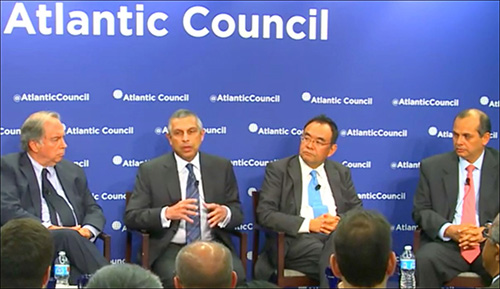 With US lawmakers on the verge of granting the White House fast-track authority to negotiate complex free-trade accords, diplomats representing four of Washington’s eleven allies in the proposed Trans-Pacific Partnership—Chile, Japan, Peru, and Singapore—gathered June 23 at the Atlantic Council to discuss TPP’s implications.
With US lawmakers on the verge of granting the White House fast-track authority to negotiate complex free-trade accords, diplomats representing four of Washington’s eleven allies in the proposed Trans-Pacific Partnership—Chile, Japan, Peru, and Singapore—gathered June 23 at the Atlantic Council to discuss TPP’s implications.
The event, sponsored by the council’s Adrienne Arsht Latin America Center, began less than an hour after the US Senate narrowly voted, sixty to thirty-seven, to end debate on Trade Promotion Authority. The House last week approved TPA, which allows lawmakers to vote for or against trade agreements but not amend or filibuster them.
Final Senate passage needs only fifty-one votes and is expected any day, clearing the way for final approval of TPP, which will eventually link 40 percent of the world’s economy in a trade bloc that includes all major Pacific Rim nations except China.
“I think we should not underestimate how much more needs to be done. Getting TPA is just one part of the process,” said Ashok Kumar Mirpuri, Singapore’s Ambassador to the United States. “We’ve come to the stage where we need some political tradeoffs. All of us have done bilateral trade agreements, and getting twelve countries in a room together only multiplies the complexities.”
He added: “We really need to move fairly quickly to achieve the objective of getting TPP in place. You do the easy parts first and leave the difficult parts for the final tradeoffs.”
Mirpuri was joined onstage by three Washington-based fellow diplomats: Chilean Ambassador Juan Gabriel Valdés; Peruvian Ambassador Luís Miguel Castilla; and Kanji Yamanouchi, Minister for Economic Affairs at the Japanese Embassy. Jason Marczak, Deputy Director of the Adrienne Arsht Latin America Center, moderated the event.
“We Chileans are a bit used to these discussions on fast track. We were invited to join NAFTA in 1995 when the US didn’t have fast track,” Valdés recalled. “There was much more excitement around fast track back then. Someone in Santiago even wanted to open a coffee shop called Fast Track Café.”
These days, he said, “I’d be exaggerating if I told you Chileans read newspapers every morning to find out if it was approved or not.”
Even so, said Valdés, the proposed partnership, whose members account for a total $27.5 trillion in GDP (including $15.5 trillion for the US economy alone), faces opposition in several countries on both sides of the Pacific.
“Sometimes there’s a tendency to think that the mere approval of TPA has solved all matters pending in the discussions. This is simply not true,” said Valdés, a former Chilean Foreign Minister and envoy to Argentina, Spain and the United Nations. “This is going to be a touchy debate in our own Congress. There are certain issues that complicate things and make our participation in this treaty not as enthusiastic as it might be.”
Peru’s Castilla echoed those sentiments, noting that intellectual property rights could become a particularly sticky bone of contention.
“There’s a belief this will hinder access to pharmaceuticals and could become a social issue,” warned Castilla, who served as Peru’s Minister of Economy and Finance from 2011 to 2014, during the administration of President Ollanta Humala. “It’ll be politically difficult to convince our lawmakers that this is something that won’t cause harm.”
Nevertheless, he said, “we in Peru believe this is a strategic look towards the Pacific as a source of trade and development. It goes beyond trade. It allows us to lock in reforms and set higher standards that we wouldn’t have otherwise done. For us, trade has been beneficial, and comparing the overall performance of countries that have pursued trade policies, I think we’ve done better than the ones that haven’t.”
In fact, said Castilla, Peru’s free trade agreement with the United States came ten years after Chile’s was ratified. As a result, it’s more comprehensive in nature, he noted, and it complements other Peruvian efforts to liberalize trade, such as its launch earlier this year of talks to join the Paris-based Organization of Economic Cooperation and Development.
“It’s quite striking. Ten years ago, public opinion in Peru was against open trade, and Congress was completely against any sort of FTA. Now the numbers have flipped, to 80 percent in favor and 20 percent opposed,” said Castilla. “Overall, there is general support for free trade in country, because we’ve seen the results.
Japan’s Yamanouchi praised the Senate’s pending approval of TPA as “very good news.”
“TPP has the highest standards of any agreement ever—environmental standards, labor standards, rules on state-owned enterprises and investments. There are more than twenty chapters,” he said. “Our two leaders recognize that it has connotations not just for trade and investment, but also security. Therefore it is important for US-Japanese relations.”
Over time, said Mirpuri, other Pacific countries may join TPP. Potential newcomers could include Colombia, Indonesia, Taiwan, and someday even China.
“It started with the P4—Brunei, Chile, Singapore, and New Zealand—then the US came in,” he said. “Eventually, we want to create opportunities for others who want to meet our high standards. This isn’t meant to close anybody off, but allows a bridge into the future.”
Yet first things first, Castilla cautioned.
“This doesn’t finish with TPA. It’s round one, and we shouldn’t underestimate all the discussions ahead of us,” he said. “The real movie is just beginning.”
Larry Luxner is an editor at the Atlantic Council.
Image: Chilean Ambassador Juan Gabriel Valdés; Singapore AmbassadorAshok Kumar Mirpuri; Kanji Yamanouchi, Minister for Economic Affairs at the Japanese Embassy; and Peruvian Ambassador Luís Miguel Castilla participate in the Atlantic Council’s June 23 panel discussion on the Trans-Pacific Partnership.
